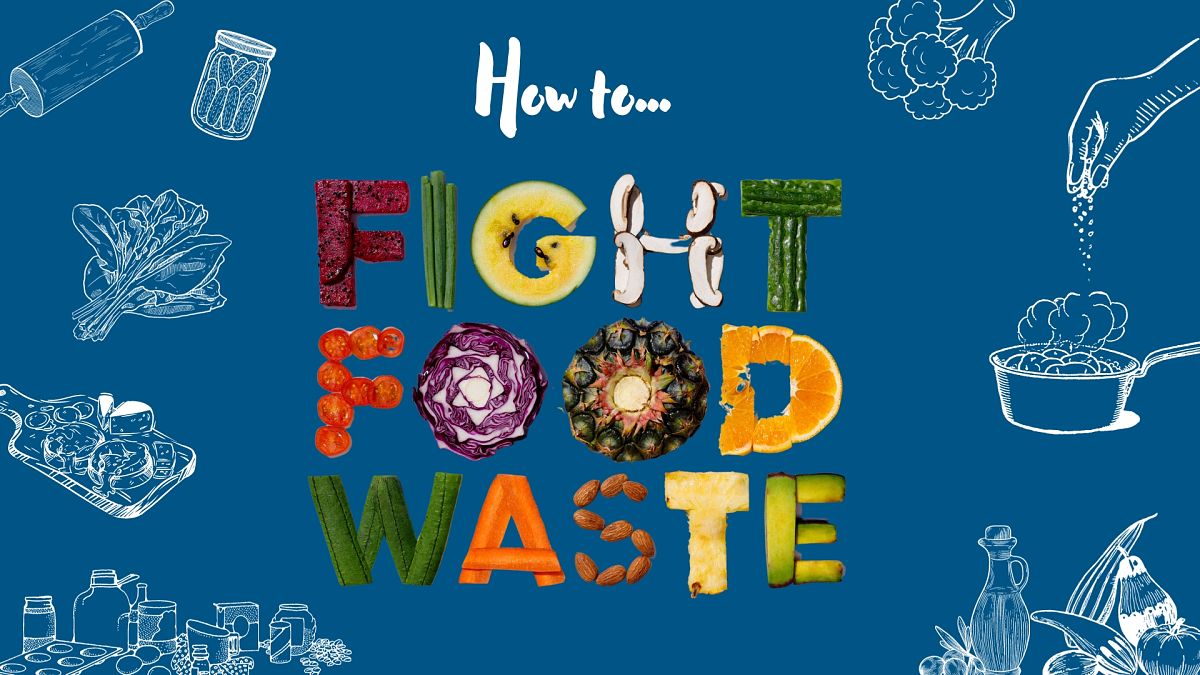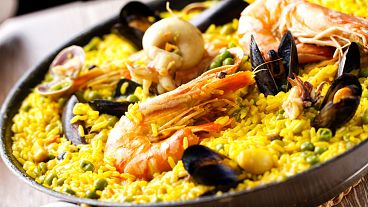New to the low-waste lifestyle? Here are some tips on how to start, and some social media accounts that can inspire you along the way.
Are you still throwing your vegetable peels in the rubbish? Do you feel guilty when you see that head of wilting lettuce staring at you from the back of your fridge, but have no idea what to do with it?
Sadly (but also perhaps reassuringly?), you’re not alone.
More than half of all food waste generated in the European Union in 2021 – a whopping 153 million tonnes of it – came from households. The UN says that half of all fruits and vegetables sold in the EU end up in the bin.
The statistics on food waste in Europe, a continent that prides itself on its environmental consciousness and progressiveness, are actually pretty dismal.
But starting from the bottom can also be exciting – it means there’s nowhere to go but up.
You can make simple changes on an individual level that will make a world of difference to your environment.
If you’re eager to reduce your food waste but don’t know where to start, we’ve compiled some of the best low-waste cooking and lifestyle accounts across the internet to help you make better use of your food, along with some tips and tricks to get started.
It might even make you a better cook!
1. Get acquainted with composting. It’s not just for people with yards!
Composting can be a scary concept. The idea of a pile of leftover food decomposing in your already cramped studio apartment might make your skin crawl.
But if composting is something you’re intrigued by, or if you want some free nutrient-rich soil for your houseplants, a lack of space isn’t something that should stop you.
There are composting options for homes of all sizes – take a look at the Bokashi composting technique, which is perfect for small spaces.
And if you need some inspiration on all things composting, check out Compost Fairy’s account on Instagram or YouTube. The compost educator and consultant regularly posts videos explaining the ins and outs of composting.
She even put together a handy guide explaining the basics for beginners.
2. Get creative with your vegetable peels
Vegetable peels are among the most common kitchen scraps to end up in the bin. You could throw these in the compost if that’s available to you. But you could also use this opportunity to let your inner chef go wild!
The classic thing would be to make some vegetable broth, by throwing in any leftover peels along with carrot tops, onion skins, wilting herbs you have lying in the fridge and aromatics like garlic.
But, you could take a page out of Alessandro Vitale’s book and make veggie chips by marinating the peels and throwing them in the oven. He even has a recipe for zero-waste dip to go along with it.
Vitale is an urban gardening expert based in London and his account has lots of tips on how to grow your own produce and make the most of every inch of it. It’s a great place to get tips on how to reduce your food waste and live a greener lifestyle in a major city.
3. Get yourself some good containers (with lids!)
Another key to wasting less food is buying only as many perishables as you know you can eat, and storing them in a way that keeps them fresh for as long as possible.
Here’s a useful video from Vitale on how to store different types of produce in your fridge to make it last longer.
A good place to start is by getting rid of that cling wrap and investing in some quality glass tupperware with lids, so your leftovers can stay fresh for days.
Another tip that works in a pinch is covering a bowl of leftovers with a plate.
4. Discover the magic of Aquafaba
Zero-waste cooking is an exercise in deconstructing your previously-held ideas about what works in the kitchen. One of the most elegant examples of an ingredient that can be used in a million different ways is Aquafaba.
That leftover liquid in your jars of chickpeas, which you’ve probably been throwing down the drain, is actually liquid gold.
Did you know you can use it as an egg replacement to make vegan desserts, mayonnaise and even cocktails?
Check out some tips on what to make with Aquafaba from the Zero Waste Cooking School Instagram account, which is run by Douglas McMaster, zero-food waste pioneer and owner of the world’s first zero-waste restaurant Silo London.
The Zero Waste Cooking School is a rich resource for ideas – like how to transform fruit peels into probiotic beverages, how to create flavour bombs from produce forgotten in your fridge and more.
5. Rescue wilting lettuce with this ice water trick
Almost any leafy green can be rescued with a handful of ice cubes and some water. If you notice your beautiful iceberg lettuce is looking a little frumpy, try these tips from Mei and Irene Li.
The chef-sisters, based in Glasgow and Boston, have been developing recipes that save produce from the depths of refrigerated despair.
They released a cookbook called “Perfectly Good Food: A Totally Achievable Zero Waste Approach to Home Cooking” that demystifies the idea of zero-waste cooking and makes it approachable for pretty much anyone.
And their Instagram account is full of tips on how to use up specific ingredients, creative ways to use kitchen scraps and inspiration for mouth-watering “everything but the kitchen sink” meals.
6. Freeze everything!
Speaking of saving food before it goes bad, you’re probably not using your freezer enough! There are so many things you can freeze and save, and so many techniques to make it easier to use them in the future.
You may have heard of freezing fresh herbs in ice cube trays to make single-serve flavour bombs for later. But if you’ve ever wondered how to freeze something - and what you can do with it later - you’ll love Kate Hall’s Instagram called “Can I Freeze It?”
The zero waste advocate posts a new video every Friday that explains how to freeze a specific ingredient and then what you can make with it when you defrost it!
Spoiler: The answer to the question is almost always YES YOU CAN!
7. Have fun experimenting with new recipes
The best way to stick to a new lifestyle is to make it fun!
Instead of putting pressure on yourself to save your scraps because it’s good for the environment and you want to be a good citizen of the world, try reframing.
Make saving your scraps something you want to do because it’s a good way to try out new recipes and enjoy yourself in the kitchen.
Many of the accounts we’ve shared have delicious recipes to try, but if you want even more inspiration take a look through Max La Manna’s Instagram account.
The low-waste chef published a vegan cookbook last year called “You Can Cook This!” about how to turn 30 commonly wasted foods into delicious plant-based meals.
You’ll find plenty of delicious and creative recipes on his account that help you save produce from the bin while discovering your new favourite meal.
You can check out our interview with La Manna here. And let us know in the comments what your favourite tips are for reducing waste in your kitchen!



